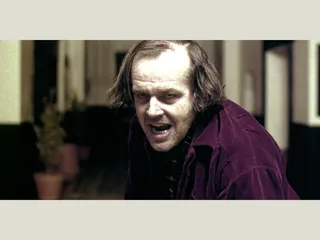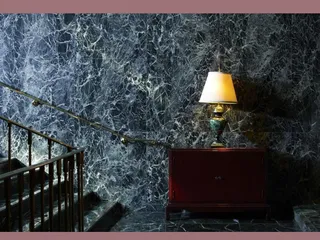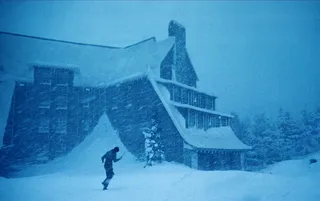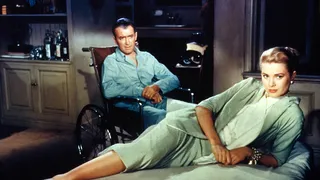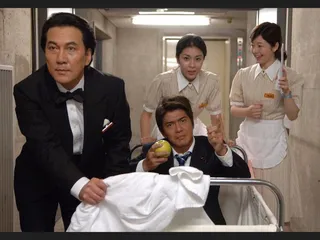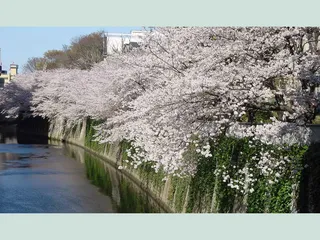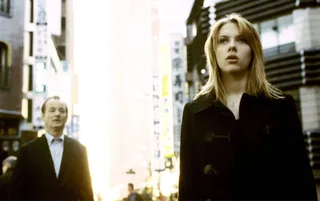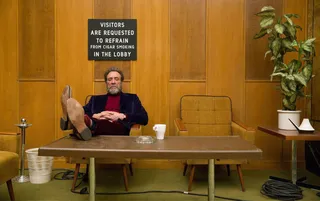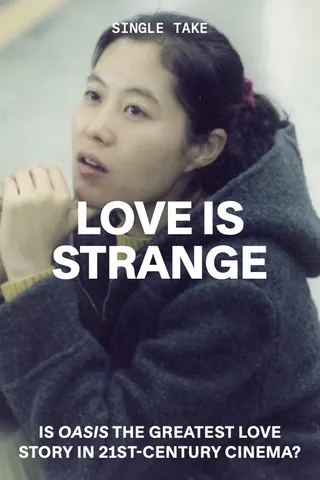The Other Guests
By Lawrence Osborne
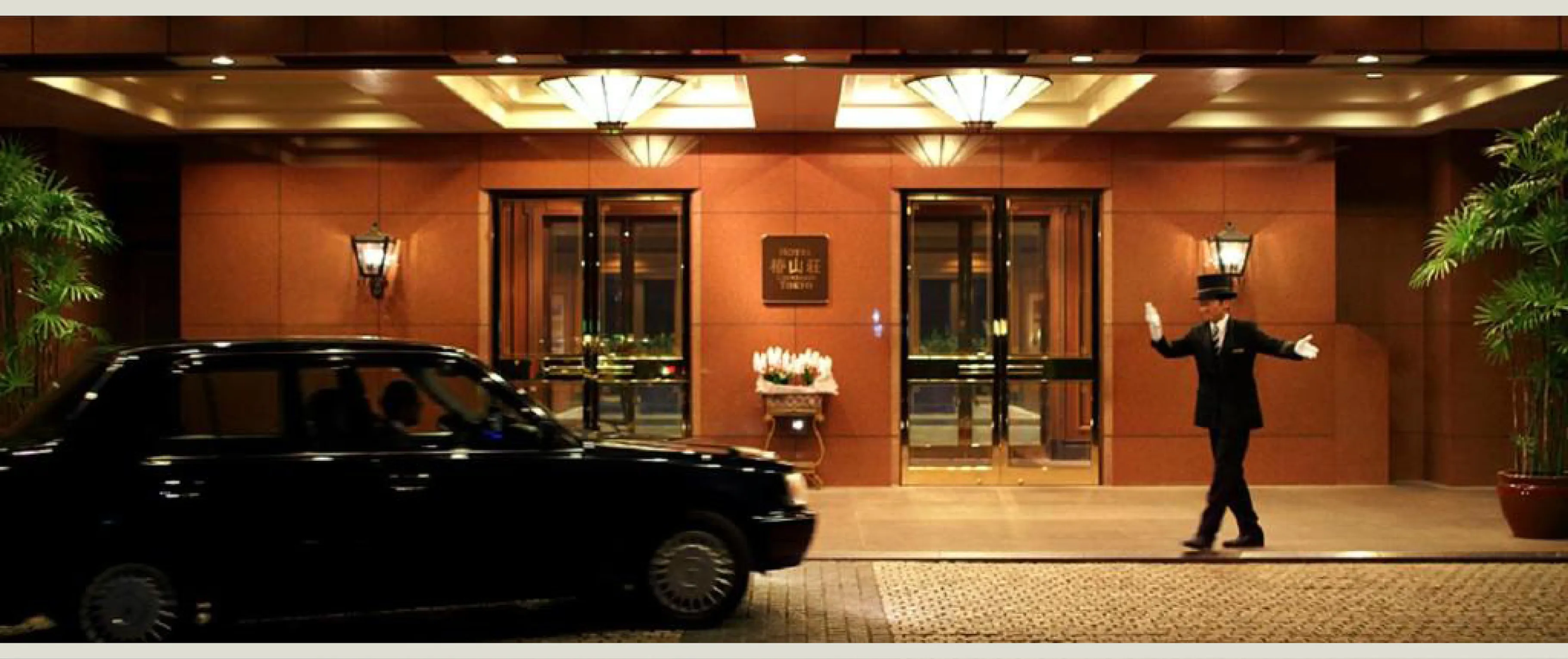
Hotel Chinzanso Tokyo
The other guests
A writer in residence at a 5-star Tokyo hotel wonders: How much can we really know of our fellow travelers?
By Lawrence Osborne
July 10, 2025
Even as I was driving from Haneda Airport on the day of my arrival in Tokyo for a long stay at the Chinzanso Hotel, I felt I had seen the neighborhood of Waseda before. The trees filled with winter lights, waiting crowds halted by traffic signals, and bicycles gliding along the shoulders of smooth and uncontaminated roads. My unconscious had been there before me. It was night and the first snow had not yet arrived.
![]()
Jack Nicholson in The Shining
![]()
Interior of Hotel Chinzanso Tokyo
The taxi passed Edogawa Station, the Kanda River below the bridges black and narrow like a canal. We climbed a hill, on a street of condo blocks, with small trees and occasional rails and a French bakery where ladies in fur hats sat outside. The sidewalks were empty here, with only the bicycles flowing downhill in their allocated lanes. At the hotel’s front doors, the manager and his team were waiting in black suits. A film company had booked me in for an eight-week stay in order to write a script for them, all expenses paid, the idea being to immerse me in what could be called an atmosphere of total unreality. Without money concerns, without obligations, without the need for cash and with no real need to even leave the hotel premises unless I absolutely needed or wanted to. The commission was to write a story about supernatural events inside a single hotel, a story mixing, it could be said, The Shining and Don’t Look Now. In reality I had no idea what I would write, or how. I had no expectation about the hotel itself, which had been suggested and arranged by the Japanese team of the film company. They knew their Tokyo hotels. The Chinzanso was a former Four Seasons, famous for its historic gardens and its old-world high-society charm. It was where Tokyo socialites went for afternoon tea and where Important Men used with subtlety its reputation for discretion. A vast sprawling complex built around the former mansion of a Meiji-era prime minister named Yamagata Aritomo.
“Hotels are natural breeding grounds for fantasy.”
It was the beginning of December and the lobby was dominated by a Christmas tree and a model train set. Behind these, a choir singing carols in perfect German. There were silk walls covered with prints, Chinese chests that had been there since before it was a hotel, Qing cabinets and images of herons. It was a grand hotel frozen in time, the late 1950s maybe, and benefiting from this deliberate suspension.
What a refreshing change from minimalist, high-tech five-star Tokyo hotels in Ginza. The Chinzanso offered a plushly formal atmosphere, a style comfortable with chandeliers and gold rails. In the lobby’s heavy armchairs, middle-aged couples sat waiting to be seated at a restaurant nearby, looking like people waiting in a rural station for a train that was an hour late or would never come at all. Nor would they mind, with German carols and Christmas lights all around them. I was taken up to my long-term suite, a cavernous space by Tokyo standards. Because it was on a high floor, the windows were already filled with the outside lights that sparkled all over a forest-like garden. The room was in the French style of decades past, beloved by the Japanese in decades past. The walls heavily papered, the drapes and curtains a pale gold; more chandeliers and armchairs with striped upholstery. No hotel iPad or digital speaker system, just a good old solid telephone with a cord.
Standing at the windows, I could see the rest of the hotel rooms spread out over what looked like the opened leaves of a gigantic book. Because these “leaves” were angled, I was able to observe dozens of other guests standing at their own windows, looking down at the son et lumière show below—for around the streams and bridges and camellia trees an artificial mist was rising to envelop everything, accompanied by ghostly spa music. The hillside glowed with hundreds of points of light. “The souls of the dead,” someone later explained to me, for a Buddhist son et lumière is apparently very different from what you get at the Roman Theatre of Orange.
From left: The Shining, dir. Stanley Kubrick, 1980; Rear Window, dir. Alfred Hitchcock, 1954
There was a cluster of lights buried in the wintry trees, and this was the hotel’s ishiyaki hot-stone restaurant. On the twisting footpaths around it, people could be seen moving against the darkness with pencil torches. But I was more taken by the lit-up skyscrapers on the horizon beyond the woods. The neighborhood of Ikebukuro. They seemed less real than the contrived hotel gardens with their transplanted pagoda, shining vertically with a cold fervor of their own.
So this was to be home for two months: office and luxury dorm cell, a multi-restaurant complex, a basement bar, an afternoon tea joint, a shiatsu-massage spa, a 12th-century pagoda transplanted from Hiroshima Prefecture, shops and endless carpeted corridors and the lovely hillside by the old Kanda Aqueduct called Tsubakiyama (Camellia Hill) in Edo days. A place where Edo’s aristocrats enjoyed summer picnics by the cooling streams and where the poet Bashō once had his office as superintendent of waterworks.
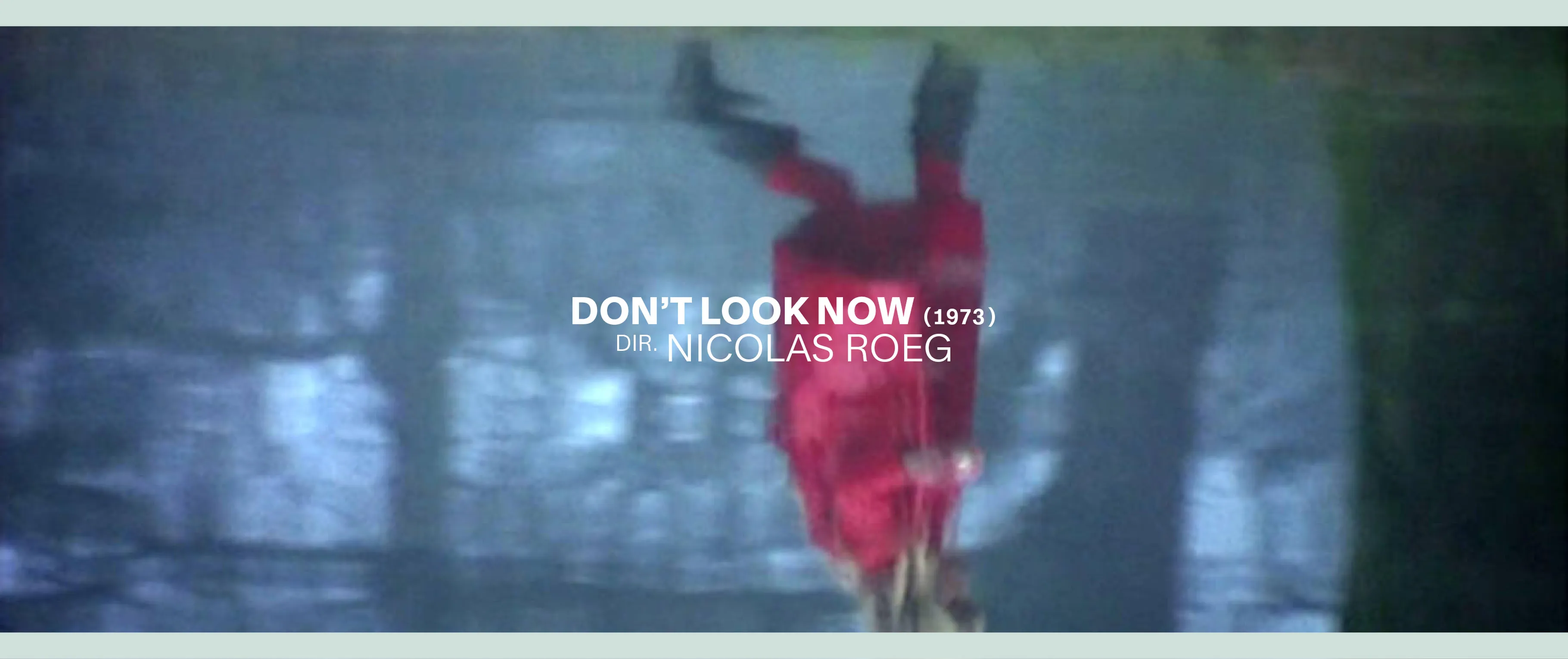
That night I walked up the pagoda. If I had been dropped there blindfolded, I would never have guessed that I was in the world’s largest city. The miniature forest was backlit by urban glare, but there was no sound apart from the ghost music and the wind in the pines. And as I sat there alone, I looked back at the hotel’s great walls of both lit and unlit windows and began to think that my story would be less Don’t Look Now and more a kind of Japanese Rear Window. I could see a woman brushing her hair in one unit, dressed in a scarlet silk dressing gown, and two windows over a businessman in a suit holding in one hand a cup of tea on a saucer. He was eating biscuits from the saucer and staring out at the “dead souls.” There was something curiously antiquated about both, as if they had stepped out from the past for a moment just to take a look at the appalling 21st century.
In any large hotel, you always wonder who is cooped up there with you. Adulterers and crooks, vagrant check forgers on the lam placed next door to honeymooning couples and minor pop stars. Part of the Chinzanso is a famous chapel—one of three, and with three shrines, where society weddings happen almost every day, and sometimes a dozen a day. After these the gardens fill with dozens of bridesmaids in kimonos and full geisha hairdos blocking the wooden bridges as they take group selfies. They, too, were probably among the shadows moving across the windows. A week later, in fact, I had begun to recognize a few recurring faces, and some I was sure belonged to those painted maids who had stayed on. In the basement bar where I found myself lingering night after night—at a loss where else to put myself and psychologically unable to tear myself away from the Chinzanso even for a two-hour restaurant run in nearby Kagurazaka—I scanned all the “recurrents,” as I called them, and assigned secret names to them. The old lady with the little dog (surely she had a Chekhov story behind her); the 60-year-old slicker eternally at the bar with a highball, ever-changing tie pins and the same phrase directed at the barman: Baka yoona yo. “Come on, cut the crap.” A sourly beautiful girl with painted black lips seated in front of a mimosa that never seemed to empty out; upper-echelon executives clearly there on a stag party jaunt, hardcore drinkers of vintage Mars single malt. But no foreigners, at least not in the bar. Would any of the Japanese, though, stay for two months?
![]()
The Uchōten Hotel (Suite Dreams), dir. Kōki Mitani, 2006
![]()
Cherry blossoms on the grounds of Hotel Chinzanso Tokyo
Sometimes I would meet them along the hotel’s vast and mysterious network of interlocking corridors, which converge at small junctions fitted out with gold mirrors, console tables and prints of rare wildflowers. Since these passageways are hushed by thick carpets, I could not anticipate the approach of a stranger. They came upon me suddenly as I turned a corner, and there would be the half-familiar face from the bar resurfaced in a more golden light. How to react? A quick konbanwa, a half bow and a quick avoidance. My Japanese is almost bad enough to say, “Wait, didn’t I just see you at the bar?” but somehow Japan is not made for impromptu interruptions driven by nosiness or even by passing erotic curiosity. Among framed watercolors and strange wind-like noises moving behind the papered walls, it didn’t quite seem feasible or even desirable. In a hotel like this, after all, you are alone. And you are paying to be alone. You are a paying ghost of sorts and everyone else is also a paying ghost. Thus it was that I began to think that my story should be a kind of Rear Window but populated by ghosts. I thought to myself that if I were to stay here a year, or just a couple of months, I would surely meet some.
One night, in fact, as I sat at the bar after it had emptied out, I was offered a drink by a Japanese gentleman who said he was in Tokyo attending a trade fair. I didn’t quite believe him, but I could not have said why. His cuff links were in the shape of silver dice with black enamel spots. He told me that the Chinzanso was certainly haunted anyway. He had heard that the pagoda itself was inhabited by the ghosts of people incinerated at Hiroshima in 1945. They could be seen inside the hotel, walking the corridors late at night or peering out of windows, dressed as if it was the summer of that long-ago year. He had seen one himself.
An old woman in a summer dress and looking as if she was sweltering in the middle of winter. “Maybe,” I said, “she just came out of the onsen.” Of course, he conceded, that was very likely the explanation. But why then was she wearing a strange little 1940s hat? He glanced over at the empty corridor outside the bar from where the winter trees could be seen moving in slow motion behind the high windows of the ground floor. Didn’t I feel it here, the people of the past looking at us? And not just the dim sepia photographs on the walls—the late shogunate samurai in stand-fall collars, the long-dead society beauties of the Shōwa. They had not departed. But also the other guests. How long was I there for, he asked. Two months? He leaned in.
“Some of these people have been here for years.”
“The hotel is a perfect plot foil. It gives us the Aristotelian unities—unity of place, action and time—all in one convenient building.”
I never saw this person again, and over the following weeks, I kept wondering who he had really been. The mystery of hotels has always been that they attract transients who come and go and leave no trace. But he might have been right about the ghosts. Having lived in Asia for years, I am by now not averse to this particular superstition. Night after night as I worked at my desk positioned by the panoramic windows, the lights of Ikebukuro in the distance and the hotel garden’s fake mists—produced to effect a “sea of clouds”—rising over the eaves of the haunted pagoda, I would take little breaks and survey the hundred or so windows visible from mine. By lowering my own lights, I could make myself virtually invisible to others and so could watch their comings and goings without being detected.
The trade-fair man’s assertion came back to mind. How many of these elusive figures standing half-lit at their windows were not just fellow guests but fellow travelers? Sometimes one would turn and seem to notice me, the shadowy writer behind a desk peering at them more than he should be. Could they really see me—and would they call reception to complain about being spied on? For in fact I was spying on them. I had become the actor in my own Rear Window. Except that now it had turned into a real ghost story. What if the characters in their rooms were the ghosts of people vaporized on a summer day in 1945 and now inhabiting the environs of the miraculously untouched pagoda from their hometown? What if only one person could see them and only late at night?
Hotels are natural breeding grounds for fantasy. Perhaps that is why stories confined to them—like Polanski’s apartment films—are chillingly compelling. From The Shining to Fear and the adaptation of Stephen King’s “1408,” which imagines a writer experiencing supernatural trauma in a hotel room. There is also the Japanese comedy The Uchōten Hotel (or Suite Dreams), set during New Year’s Eve, implying that my limbo could have been in either mode, and of course Lost in Translation’s use of Tokyo’s Park Hyatt. Who can forget Ralph Fiennes in The Grand Budapest Hotel and his lobby boy Zero? Or Hercule Poirot in the “Evil Under the Sun” episode of Poirot? Agatha Christie’s romp was filmed for TV at Devon’s Burgh Island Hotel, a place cut off from the English mainland twice a day at high tide. The hotel is a perfect plot foil. It gives us the Aristotelian unities—unity of place, action and time—all in one convenient building.
![]()
Lost in Translation, dir. Sofia Coppola, 2003
![]()
The Grand Budapest Hotel, dir. Wes Anderson, 2014
There was something else, however, that made the passing weeks—and then months—even stranger. I found myself getting up earlier and earlier, as if rebuking my lifelong habit of getting up around noon after working until 4am. This encouraged me to establish a new routine based solely on the convenience of the hotel. For where else can you wake up and simply walk down to seven different restaurants? It happened in the week between Christmas and New Year’s. I started getting up at eight and walking to the elevator dressed in a suit and tie. Why I liked this formality I have no idea. Then, as the elevator doors opened, I began taking a selfie—an amusing little ritual. Something in my unconscious had been stimulated.
One morning when snow was finally falling upon the gardens seen from the breakfast room, I scrolled through these goofy images and saw that the time when they were taken was nearly always between 8:12 and 8:15. It was as if some internal clockwork had been activated by the clock-conscious formality of the hotel itself. As if the hotel was a living thing that reacted with or against other living things. One’s self-perception, after all, does indeed change when one’s environment changes. I could not help recalling that I was living inside Prime Minister Aritomo’s former residence, that I was in some sense living upon the dead samurai so poignantly arrayed along its mile-long corridors. Superstitiously, I began to wonder if there were morning ablution rituals practiced in centuries past. Between 8:12 and 8:15 perhaps. Or else the hotel was slowly starting to drive me mad in a quiet and unobtrusive way. In the same way I found that I was always ordering the same thing at breakfast every day, things that I never eat: two hard-boiled eggs in silver cups, Japanese pickles and grilled saba. The breakfast of Meiji ministers?
My two months passed in a dreamlike state of repetition, continuously, sameness. I found that I wanted it to go on forever like that. I wrote my script, began to rewrite it as a story, then as a novella. The characters from my stay popped up inside it like nightmarish jack-in-the-boxes. But somehow it all had coherence, it all made sense. Then one afternoon I was looking at photographs in one of the galleries and came upon an old picture of the pagoda standing in its original Hiroshima temple. Underneath was a caption that explained that the temple had survived the atomic bombing, which had occurred on the morning of August 6, 1945, at 8:15.
